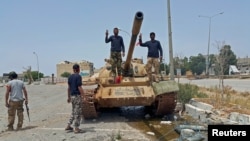A few days ago fighters with Islamic State’s affiliate in Libya were gloating about recent battlefield successes and appeared poised to launch an offensive on oil fields near Sirte, the coastal city they overran last month. But in recent days they suffered two serious reversals.
A US airstrike mounted in the early hours of Sunday morning seems likely to have taken out a significant jihadi ally - veteran jihadist leader Mokhtar Belmokhtar, the instigator of the deadly storming of a natural gas plant in Algeria in 2013 that left 39 hostages dead.
And in Derna, which Islamists and jihadists have been battling for control of for weeks, local reports - which are difficult to verify - point to Islamic State being pushed out of most of the city, although locals contacted by phone say there is still fighting in the center.
An Egyptian IS commander is reported to have been killed in Derna. The jihadists, according to Mohamed Eljarh, an analyst for the Rafik Hariri Center of the Atlantic Council “have lost control of most of their sites within the city of Derna.”
According to Thomas Joscelyn, an analyst at the Foundation for Defense of Democracies, a US think tank, the fighting in Derna is not going the Islamic State’s way. “It is a battle Abu Bakr al Baghdadi’s men risk losing." He added, “a few of the Islamic State’s key leaders in Derna have been reportedly killed or captured, but the details remain murky.”
But he warns, “It is too early to declare a victor. There is an ebb and flow to such battles, and the group has struck back by unleashing its signature suicide bombers in the heart of the city.”
But officials in both of Libya’s rival governments — an internationally recognized one based in Tobruk and Beida, and an Islamist-dominated rebel administration in Tripoli — caution that as long as the country remains ensnared in a civil war, the jihadis will have plenty of opportunities to capitalize on the power struggle dividing the country. And the government in Tobruk/Beida is urging the West to intervene more heavily to take on jihadi groups.
As jihadis were being pushed out of Derna they launched two suicide bombing attacks.
The alliance battling Islamic State in Derna is not, though, a moderate or secular-based one: most of the militias involved are considered hardline Islamist and a couple, including the Abu Salim Martyrs Brigade, have been linked to al-Qaida.
A political activist based outside Libya, Ayat Mneina, posted on her Facebook page that ordinary residents are siding with the anti-IS alliance. “Civilians have joined the fight against terrorism in the city. Just spoke to cousins who are all out fighting, defending their city,” she posted.
Both governments for propaganda purposes have accused the other at various times of assisting jihadis.
But the loss of Sirte to the jihadis as well as checkpoint suicide bombings near the town of Misrata recently have unnerved the rival governments and added some impetus to peace talks. The government in Beida issued a statement saying the US had consulted with it before launching the weekend airstrike targeting a farmhouse near the eastern city of Ajdabiya, where Belmokhtar was meeting with jihadis aligned reportedly with different Islamic extremist groups.
“The Libyan government confirms that this operation is part of the international support which has long been called for by the interim Libyan government to fight terrorism,” read the statement.
The setbacks recently dealt to the jihadis, though, could be reversed, if the power struggle dividing Libya persists, analysts and Western diplomats warn.
Last week, UN-sponsored talks in Morocco and Berlin between the rival governments - both are being pushed hard by European governments to resolve their standoff - appeared to be heading for failure, despite the fact that for the first time since the peace initiative was launched the four-strong negotiating teams met face-to-face.
The Tripoli government, known widely as Libya Dawn, accepted a fourth and final draft of a complicated peace deal drawn up by UN envoy Bernardino Leon. But the recognized government, which fled east last summer, chased out of the Libyan capital by Libya Dawn militias, has so far rejected the deal - as have some in the town of Misrata, a key backer of the government in Tripoli.
Leon once again on Monday urged the warring factions to reach an agreement, stressing “the need for Libyans to put an end to conflicts and to act quickly to reach a political agreement, restore security and stability in their country.” The envoy has marked June 17 - the day before Ramadan starts - as a deadline for a deal. Western diplomats have warned both governments that only jihadi groups will be the winners if there isn't an accord.
Last week, German Foreign Minister Frank-Walter Steinmeier said during the Berlin round of talks that diplomats had warned the rival governments there wouldn’t be many more opportunities to reach a deal. “Perhaps this is the last chance to prevent Libya from complete collapse,” he said.
While official talks have stalled, some tribal and militia leaders backing opposing sides have tried to hammer out local deals themselves in western Libya. Militias from the towns of Zintan and Zawia oversaw truces agreed between Zuwara and the nearby towns of Al-Jmail, Rigdalin and Zultan.
That agreement followed a local deal being agreed between Zintan, which backs the government in Beida, and Gharyan. The deals are a result of the intervention of tribal elders.




